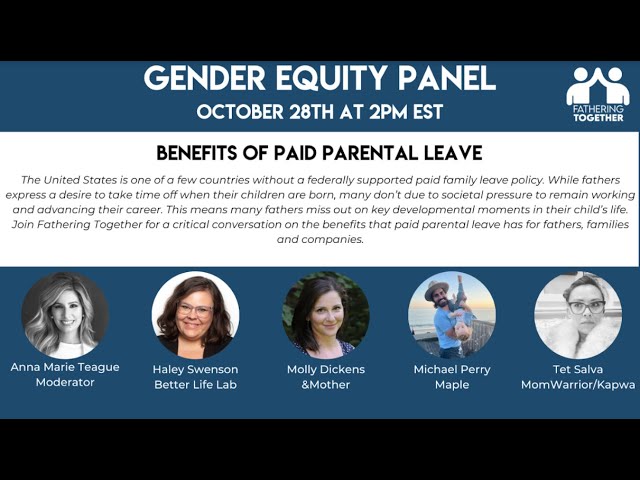Benefits of Paid Parental Leave
Paid parental leave is a crucial aspect of any family-friendly workplace policy. It provides numerous benefits to both parents and their employers. In this article, we will explore the advantages of paid parental leave and why it is essential for the well-being of employees and their families.
Enhanced Work-Life Balance
Achieving a healthy work-life balance is a constant challenge for many working parents. Paid parental leave allows parents to take time off work to bond with their newborn or adopted child without sacrificing their income. This time away from work helps parents establish a strong connection with their child during the crucial early stages of development.
Improved Employee Retention
Offering paid parental leave can significantly contribute to employee retention rates. When employers support their employees in their personal lives, it fosters loyalty and commitment. Employees who feel valued and supported are more likely to remain with the company in the long term, reducing turnover costs and maintaining a stable workforce.
Positive Impact on Employee Morale
Providing paid parental leave demonstrates that employers care about the well-being of their employees and their families. This gesture boosts employee morale and creates a positive work environment. When employees feel supported, they are more motivated, engaged, and productive, leading to better overall performance.
Health and Well-being of Parents
Paid parental leave allows parents to prioritize their health and well-being during a critical phase in their lives. The birth or adoption of a child can be physically and emotionally demanding. With paid leave, parents can recover from childbirth, establish breastfeeding routines, and address any postpartum or adoption-related challenges without the added stress of returning to work immediately.
Child Development and Bonding
The early years of a child’s life are crucial for their development. Paid parental leave enables parents to be fully present and actively participate in their child’s growth. Research shows that parental involvement in the early stages has a positive impact on the child’s cognitive, emotional, and social development. By taking paid leave, parents can create a solid foundation for their child’s future.
Reduced Gender Inequality
One of the significant advantages of paid parental leave is its potential to reduce gender inequality in the workplace. When both parents have access to paid leave, it encourages a more equitable distribution of caregiving responsibilities. This not only supports women in their career progression but also challenges traditional gender roles and promotes a more inclusive work environment.
Competitive Advantage for Employers
Employers who offer paid parental leave gain a competitive edge in attracting and retaining top talent. In today’s job market, employees actively seek out companies that prioritize work-life balance and family-friendly policies. By providing paid leave, employers position themselves as desirable workplaces, enhancing their employer brand and attracting highly skilled professionals.

Paid parental leave has numerous benefits for both employees and employers. It promotes work-life balance, enhances employee retention, boosts morale, and supports the health and well-being of parents. Additionally, it positively impacts child development, reduces gender inequality, and provides a competitive advantage to employers. By recognizing the importance of paid parental leave, organizations can create a supportive and inclusive work environment that fosters the success and happiness of their employees and their families.
Frequently Asked Questions
1. What is paid parental leave?
Paid parental leave refers to the time off provided by employers, with pay, to employees who become parents through childbirth, adoption, or foster care.
2. Why is paid parental leave important?
Paid parental leave is important as it allows parents to bond with their newborn or adopted child, promotes the child’s development, and supports the overall well-being of the family.
3. What are the benefits of paid parental leave?
The benefits of paid parental leave include increased parental involvement, improved child health outcomes, higher employee retention, and reduced gender inequality in the workplace.
4. Does paid parental leave benefit employers?
Yes, paid parental leave can benefit employers by enhancing employee morale, loyalty, and productivity. It also helps attract and retain talented individuals.
5. Is paid parental leave available to both mothers and fathers?
Yes, paid parental leave should be available to both mothers and fathers, promoting gender equality and encouraging shared parenting responsibilities.
6. How long does paid parental leave typically last?
The duration of paid parental leave varies depending on the country, company policies, and individual circumstances. It can range from a few weeks to several months.
7. Are self-employed individuals eligible for paid parental leave?
Eligibility for paid parental leave may vary for self-employed individuals. In some countries, self-employed individuals can opt for government-funded maternity or paternity benefits.
8. Does paid parental leave apply to adoptive parents?
Yes, paid parental leave should apply to adoptive parents, recognizing the importance of bonding and providing care for the newly adopted child.
9. Are there any countries that do not offer paid parental leave?
While most countries have some form of paid parental leave, there are still a few countries that do not provide a statutory right to paid leave for new parents.
10. How does paid parental leave contribute to gender equality?
Paid parental leave contributes to gender equality by encouraging fathers to take an active role in caregiving, reducing the burden on mothers, and challenging traditional gender roles.




